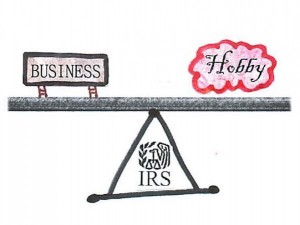If an individual, partnership, estate, trust, or an S corporation engages in an activity that
is not conducted as a for-profit business, deductions are limited to the amount of income
from the activity. If an activity is considered a for-profit business, deductions can exceed
income, allowing the resulting loss to offset other income. Regulations contain a list of
factors to be considered in determining whether an activity is engaged in for profit. The
factors include:
(1) The manner in which the taxpayer carries on the activity,
(2) The expertise of the taxpayer or his advisers,
(3) The time and effort expended by the taxpayer in carrying on the activity,
(4) The expectation that assets used in the activity may appreciate in value,
(5) The success of the taxpayer in carrying on other similar or dissimilar activities,
(6) The taxpayer’s history of income or losses with respect to the activity,
(7) The amount of occasional profits, if any, which are earned,
(8) The financial status of the taxpayer, and
(9) Whether elements of personal pleasure or recreation are involved.
No single factor is determinative. Note that in item (6) above, there are no specifics on how many years of loss need be incurred to be considered/determined a hobby. There is a sort of wives tale that you would be presumed to have a hobby if you incur lossses in 3 consecutive years. No such law/rule/regulation exists.

Court Case: The taxpayers became interested in Welsh ponies and cobs in 1995 when
their daughter began riding lessons on a Welsh pony. They purchased a second horse
in 1998. By 2003, they owned 10 horses. Their business plan was to acquire, breed, and
train high-quality Welsh ponies and cobs and sell them. They began reporting their horse
activity as a Schedule C business in 1998. After sustaining substantial losses in the activity
over the next several years, the IRS disallowed the losses, claiming the activity was a
hobby rather than a for-profit business. The court looked to the nine factors listed in IRS
regulations to determine whether the taxpayers were engaged in a hobby or a for-profit
business. For the following reasons, the court determined the manner in which the taxpayers
carried on their activity, and their history of losses indicated it was not for profit.
At first, the taxpayers paid to board their horses with third-party providers. In 1999, the
taxpayers concluded the horse activity could be profitable only if they purchased land
and facilities where they could board their horses and generate income by providing
boarding and training services to others. However, they did not begin this search until
2001, and did not actually purchase the land until 2005, on which they did not begin construction
until 2006. The taxpayers continued to acquire horses in the years after 1999, increasing
their stock from two horses to 10 even though they had not yet acquired land for
a facility. The court concluded that an actual and honest profit motive would have halted
the purchase of new horses until after obtaining the new facility to board the horses.
The taxpayers argued that they had unforeseen difficulties in acquiring property and
constructing a facility to board their horses. The court noted that IRS regulations list
drought, disease, fire, theft, weather damage, and depressed market conditions as examples
of acceptable loss-causing circumstances. The taxpayers’ failure to locate and acquire
property for six years was not attributable to circumstances beyond their control.
They did not begin their search until more than a year after the time they claimed such a
facility was essential to make a profit. They also only made offers on two properties in the
first four years of their search. The court concluded that the six-year delay in acquiring
the necessary land indicated that making a profit was not the taxpayers’ priority.
It is necessary in all cases in which a hobby determination is at least possible, that the activities of the business are reviewed in context with the 9 factors in the Regulations.